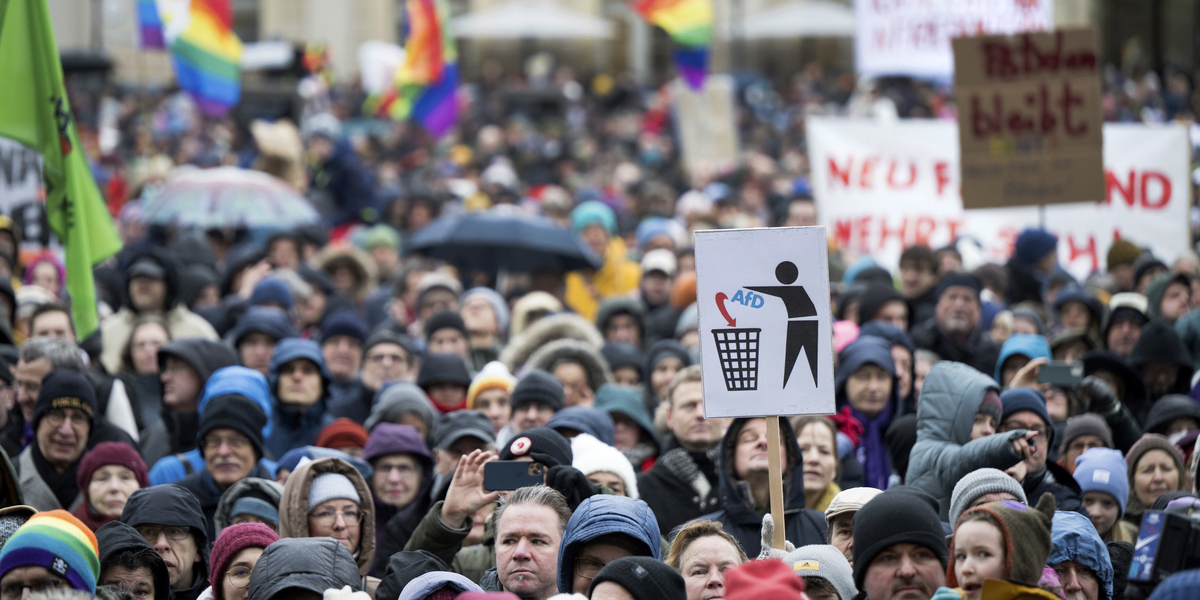In Germany for days they are held large demonstrations against the far right and in particular against the main party representing it in the country, Alternative für Deutschland (AfD), following a much-discussed investigation into a meeting between party leaders in December. According to the investigation by the German investigative journalism site Correctiv, the meeting served to discuss a large-scale expulsion plan for asylum seekers, immigrants with residence permits and also German citizens of foreign origin. The operation is defined as “remigration”.
The AfD, which is currently the second most popular party in Germany after the Christian Democratic Union (CDU, Germany’s main conservative party), has denied that “remigration” is part of its agenda. But above all the main newspapers However, the country is discussing the possibility and effectiveness of trying to ban the AfD on the basis of Article 21 of the German constitution, according to which «parties are unconstitutional which, with their objectives or with the behavior of their members, seek to weaken or abolish the free democratic fundamental order or to endanger the existence of the Federal Republic of Germany.”
– Read also: In Germany the far right has a plan for the mass expulsion of immigrants
The discussion has existed for some time, partly because German public conversation is heavily influenced by the country’s Nazi past. As explained in a recent article by Politico«in a society aware that Adolf Hitler initially won at the polls, and that the Nazis won a majority in federal elections before taking power, a growing number of political leaders, particularly on the left, see the prohibition of ‘AfD – a party they see as a terrible threat to German democracy – as an imperative rooted in historical experience.’
The suspicion that the AfD could represent a real threat to democracy is quite widespread: for some time the German internal secret services have put the party under surveillance to assess its danger to the constitutional order, and in November they classified it as an extremist group of the party branch in the federal state of Saxony-Anhalt, in north-eastern Germany, is on the right. Some representatives were also arrested for inciting hatred and using Nazi symbols.
However, public opinion, and center and left politicians, are divided on the possibility of banning the party. Recently twenty-five leaders of the Social Democratic Party, all of foreign origin, wrote a petition calling for the AfD to be banned: among them are the vice-president of the Bundestag (the German federal parliament) Aydan Özoguz; the government’s head of integration Reem Alabali-Radovan and the undersecretary of the Interior Mahmut Özdemir. The letter states that «fascist ambitions [dell’AfD] they should be examined by the secret services and criminal courts.” The president of the northern state of Schleswig-Holstein Daniel Günther said in an interview that he “definitely has some sympathy for a ban of this kind” because “we all know how dangerous they are.” And Interior Minister Nancy Faeser, also from the Social Democratic Party, said that she personally “does not rule out” the ban.
In an interview on the topic published at the beginning of January by Southgerman newspaper State Secretary for East Germany Carsten Schneider claimed instead of dissolving the AfD being complex from a legal point of view and that «banning a party that we don’t like, but which is consistently at the top of the polls, can only create a reflection of solidarity towards it, even on the part of people who do not they are neither voters nor supporters of the AfD.” Friedrich Merz, leader of the CDU, instead said that “these fake debates” only strengthen the AfD. «Do the Social Democrats really believe that we can simply ban a party that reaches 30 percent in the polls? It’s a frightening suppression of reality,” he commented.
From a practical point of view there are various reasons to think that it would be particularly complex, as well as politically risky, to succeed in banning the AfD. There are precedents: in 1952 the German Constitutional Court banned the Reich Socialist Party, heir to the Nazi Party, and in 1956 the German Communist Party.
But it is precisely something that happens very rarely: in 2017, for example, the German Constitutional Court opposed the ban on the National Democratic Party of Germany (NPD), considered at the time by many to be the most important neo-Nazi party to emerge in the country after the end of the Second World War. The request to ban the NPD at the time had come from all sixteen German states, who had attached to the request a very long dossier which intended to demonstrate the existence of points in common between the ideology of the NPD and that of the Party Adolf Hitler’s National Socialist, outlawed at the end of the Second World War. The Court found that the party met the ideological criteria for a ban, but was not influential enough to pose a real threat to the country’s democratic stability.
Today the situation is very different, as the AfD is a very popular party both nationally and in states such as Saxony, Thuringia and Brandenburg, where local elections will be held this year. The AfD is currently in first place in the polls in all three of these states. Some believe that asking the Constitutional Court to ban the AfD now would be particularly risky, especially if the Court were to later refuse to do so, because it could lead several voters to sympathize with the AfD for what would likely be seen as an attempt at censorship.
MP Alice Weidel, one of the leaders of the AfD, he recently defined the requests to ban his party are “completely absurd”, which in his opinion “highlight the anti-democratic attitude of those who make them”. “The repeated calls for a ban demonstrate that the other parties have long run out of concrete arguments against our political proposals,” Weidel added.
– Read also: The German far right is trying to exploit the farmers’ demonstrations
